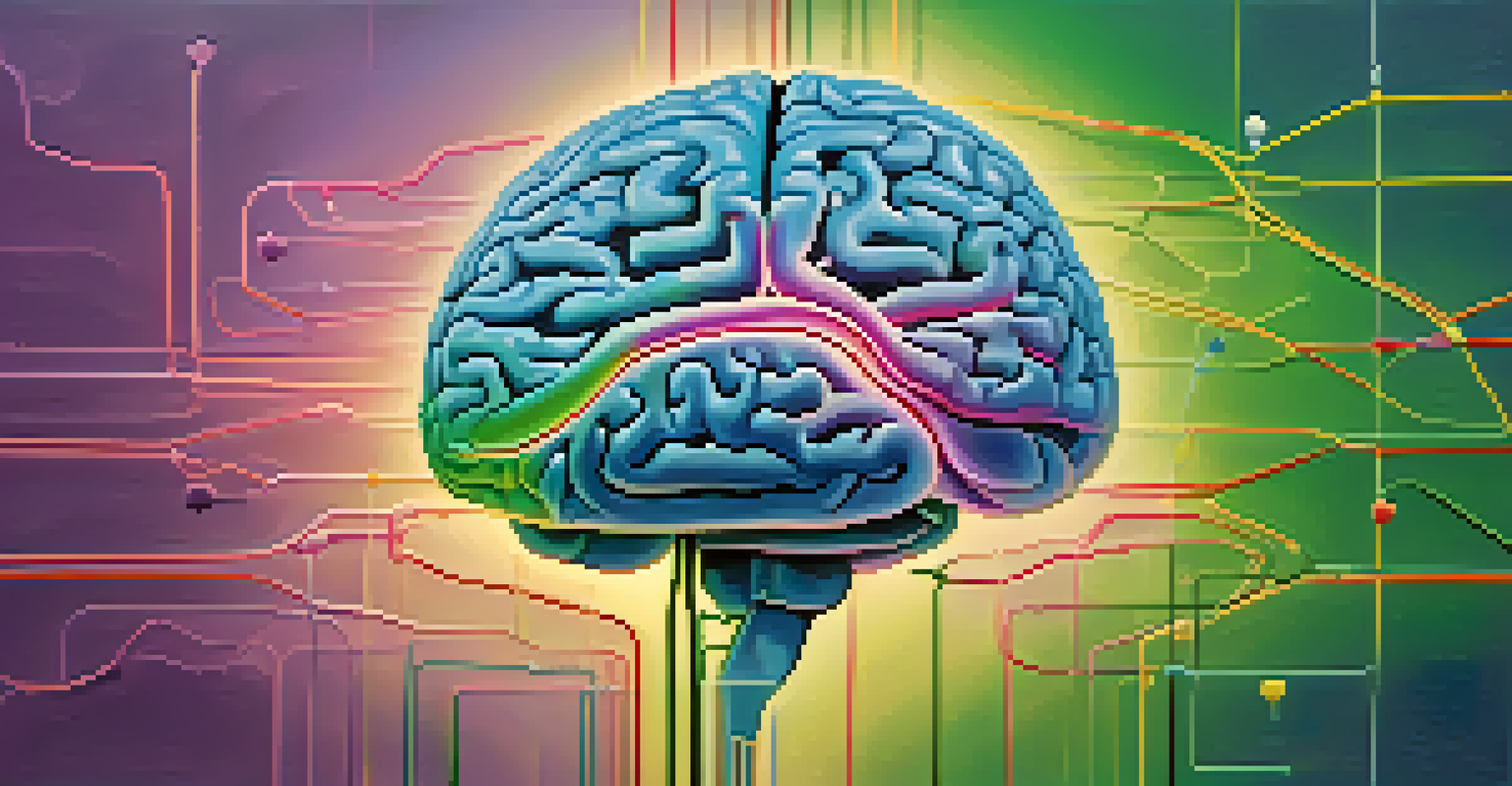The Role of Serotonin in Psychedelic Experiences Explained

Understanding Serotonin: The Brain's Mood Regulator
Serotonin is a neurotransmitter that plays a key role in regulating mood, anxiety, and happiness. Often referred to as the 'feel-good' chemical, it helps transmit signals in the brain that affect various bodily functions. When serotonin levels are balanced, it promotes feelings of well-being and emotional stability.
Psychedelics can help us uncover the depths of our consciousness and confront the traumas that we have shielded ourselves from.
In addition to mood regulation, serotonin influences a range of physiological processes, such as appetite, sleep, and memory. This complex role makes it a crucial player in how we experience the world around us. Therefore, understanding serotonin can shed light on its involvement in altered states of consciousness, particularly during psychedelic experiences.
Many people seek psychedelics like psilocybin or LSD for their potential to enhance creativity or provide emotional insights. However, these substances interact with serotonin receptors in the brain, leading to profound changes in perception and thought. This connection between serotonin and psychedelics is essential to explore.
The Connection Between Psychedelics and Serotonin Receptors
Psychedelics primarily exert their effects by binding to serotonin receptors, particularly the 5-HT2A receptor. This interaction can lead to altered sensory perceptions, emotional experiences, and even mystical states. By activating these receptors, psychedelics can enhance the brain's connectivity and lead to unique cognitive experiences.

Research shows that psychedelics can alter the flow of information in the brain, often resulting in a breakdown of the usual boundaries between different mental processes. This phenomenon is often referred to as 'ego dissolution,' where users may feel a sense of oneness with the universe. The role of serotonin in this process is vital, as it facilitates these profound shifts in consciousness.
Serotonin and Mood Regulation
Serotonin is crucial for regulating mood, anxiety, and happiness, influencing emotional stability and well-being.
Moreover, the increased serotonin activity during psychedelic experiences can lead to enhanced emotional processing. Many users report insights into their emotions and thoughts, which can contribute to therapeutic outcomes. By understanding this connection, we can better appreciate the potential benefits of psychedelics.
The Impact of Serotonin on Emotional Processing
Serotonin significantly affects how we process emotions, which is especially relevant during psychedelic experiences. When serotonin levels rise, individuals often report heightened emotional responses and insights into their feelings. This emotional clarity can lead to transformative experiences, helping users confront past traumas or unresolved issues.
The experience of ego dissolution may be one of the most profound aspects of psychedelics, allowing us to transcend our individual selves and connect with a greater whole.
During a psychedelic trip, the brain's emotional centers can become more active, allowing for deeper introspection. This heightened emotional awareness can facilitate healing and personal growth, as individuals confront difficult emotions in a new light. In this way, serotonin acts as a bridge between consciousness and emotional clarity.
Additionally, the therapeutic potential of psychedelics is increasingly recognized in mental health treatment. By harnessing the power of serotonin, these substances may help alleviate symptoms of depression, anxiety, and PTSD. The emotional breakthroughs experienced during these trips can be life-changing for many.
Serotonin and Mystical Experiences in Psychedelics
Mystical experiences are often a hallmark of psychedelic journeys, with many users reporting feelings of unity, transcendence, and connection to a higher power. These experiences can be closely tied to the effects of serotonin on the brain. By activating serotonin receptors, psychedelics can foster a sense of interconnectedness that feels profound and life-altering.
The sense of ego dissolution commonly reported during these experiences is believed to be linked to serotonin's modulation of self-referential processing. When the usual boundaries of self become blurred, individuals may feel a deep sense of belonging to the universe. This shift in perspective can lead to lasting changes in worldview and personal values.
Psychedelics Affect Serotonin Receptors
Psychedelics interact with serotonin receptors, particularly the 5-HT2A receptor, leading to altered perceptions and emotional experiences.
Importantly, the therapeutic implications of these mystical experiences are being studied. Research suggests that such experiences can lead to lasting improvements in well-being and mental health. By understanding serotonin's role, we can begin to grasp why these moments are so impactful.
The Science Behind Serotonin and Psychedelics
Scientific studies have increasingly focused on how psychedelics affect serotonin levels and their corresponding impacts on the brain. Modern imaging techniques, like fMRI, have shown that psychedelics can lead to increased connectivity between different brain regions. This heightened connectivity is thought to play a key role in the subjective experiences users report.
For instance, researchers have observed that psychedelics can decrease activity in the default mode network (DMN), a brain network associated with self-referential thought and the ego. This reduction in DMN activity is often correlated with feelings of ego dissolution and unity. Understanding these changes may illuminate the biological basis of the powerful experiences facilitated by psychedelics.
As research continues, the relationship between serotonin and psychedelics offers exciting possibilities for mental health therapies. By leveraging this understanding, scientists hope to develop new treatments for various psychiatric disorders, demonstrating the importance of serotonin in psychedelic experiences.
Potential Therapeutic Benefits of Psychedelics
The therapeutic potential of psychedelics has garnered significant interest in recent years, particularly concerning their relationship with serotonin. Studies indicate that psychedelics can lead to substantial improvements in mental health conditions, including depression, anxiety, and addiction. This is largely attributed to their ability to enhance serotonin signaling in the brain.
For many, the insights gained during a psychedelic experience can be pivotal in their healing journey. These substances may allow individuals to confront and process emotions that have been suppressed or ignored. By activating serotonin receptors, psychedelics can create an environment conducive to psychological breakthroughs.
Therapeutic Benefits of Psychedelics
Research shows psychedelics can enhance serotonin signaling, offering potential therapeutic benefits for mental health conditions like depression and anxiety.
Moreover, clinical trials are beginning to validate the efficacy of psychedelics in therapeutic settings. As we deepen our understanding of serotonin's role, we can better harness the power of these substances to promote healing and personal growth.
The Future of Psychedelic Research and Serotonin
As interest in psychedelics continues to grow, research into their relationship with serotonin is becoming increasingly relevant. Scientists are exploring various aspects of this connection, from basic neuroscience to potential therapeutic applications. This research not only enhances our understanding of the human brain but also opens up new avenues for treating mental health disorders.
Future studies may focus on how different psychedelics interact with serotonin receptors and the resulting psychological effects. By isolating specific compounds and their mechanisms, researchers aim to develop targeted treatments that are both safe and effective. This could revolutionize the field of mental health, offering alternative solutions for those who have not found relief through traditional therapies.

Additionally, as society becomes more open to discussing psychedelics, the stigma surrounding them may diminish. This shift could lead to broader acceptance and integration of psychedelics into therapeutic practices. Ultimately, the role of serotonin in these experiences will be a key focus in paving the way for a new era in mental health treatment.